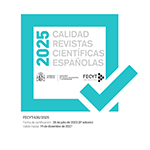Narrative identity: a bridge between hermeneutics and the social sciences
Abstract
This article arises from the need to structure a discourse on the narrative function that allows
us to deal with our experience over chronological time from its refiguration into a time of our own,
which we provide with meaning. We draw on our narrative identity to articulate this resorganisation
either as subjects or as members of culturally determined collectivities. Paul Ricoeur constructs this
aporetic corollary of Time and Narrative by combining the failure of speculative reason when dealing
with temporal experience and the simplicity of our everyday use of narrative resources to deal with it.
Following this hermeneutical corollary, we reconstruct the postulate, diffusely incorporated by political
science in the final decades of the twentieth century, and interpret the meaning of the corrosion of
identities that concerns contemporary sociology. We do so convinced of the theoretical profitability of
the genealogical analysis that links this postulate with the Ricoeurian corollary.
Downloads
Article download
License
In order to support the global exchange of knowledge, the journal Logos. Anales del Seminario de Metafísica is allowing unrestricted access to its content as from its publication in this electronic edition, and as such it is an open-access journal. The originals published in this journal are the property of the Complutense University of Madrid and any reproduction thereof in full or in part must cite the source. All content is distributed under a Creative Commons Attribution 4.0 use and distribution licence (CC BY 4.0). This circumstance must be expressly stated in these terms where necessary. You can view the summary and the complete legal text of the licence.











